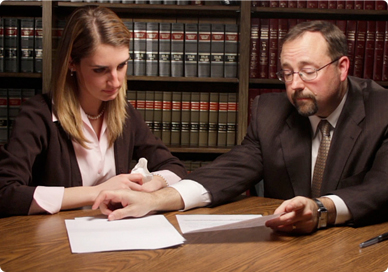|
Will I need to bring any documents to my first appointment?

What is a retainer?

Are the costs and expenses of the divorce part of the legal fee?

What are my rights?

Do the children have rights in a divorce?

How long does a divorce take?

What if my spouse doesn't hire an attorney, can you represent both the husband and the wife?

If I should I leave the marital home, is that abandonment?

Can my spouse relocate out of state with the children?

Do grandparents or others have rights to custody or visitation with the children?

Should I change my will after I divorce?

Will I need to bring any documents to my first appointment?

In a typical divorce situation clients may have questions about child support, alimony and division
of assets. In order to provide you with a range of reasonable expectations to these questions, it is
appropriate to bring financial information with you to our first appointment. The most helpful
documents are your past three years of federal tax returns, W-2's, 1099's, pay stubs, bank
statements, other income statements from a second job, rental income or interest statements.
Once a divorce is started you will be asked to provide a more comprehensive set of
documentation, but the above information will be most helpful at the first appointment.
Ultimately, we will prepare a financial affidavit which contains your income, weekly expenses,
weekly liabilities and a list of your assets.

What is a retainer?

If you hire The Law Offices of Attorney Michael K. Conway to represent you, a retainer letter will
be prepared for your signature. The retainer letter will set forth the legal fee, hourly rate, the
scope of the representation—and other items such as the cost and other expenses. A retainer is a
lump sum of money that is paid by you to this office. This is your money, until it is earned by us.
The retainer is placed into a trustee account (separate from the law firm's funds) and gradually
transferred to the law firm's account as the fee is earned over time. The amount of the retainer is
usually set at the consultation and will be determined by how complex or difficult the issues are
in your case.

Are the costs and expenses of the divorce part of the legal fee?

The legal fee set in the retainer letter is used solely to pay us for our time. In addition to the legal
fee, there will most likely be expenses associated with the divorce—particularly if you are
initiating the divorce. The cost and expenses are not paid out of the retainer but are paid by you.
Two examples of costs that you can expect at the start of the case are the entry fee, charged by
the court, and the marshal's bill for serving the paperwork. The retainer letter will set forth what
those costs are to begin the action. However, if it is necessary to have real property appraised,
subpoena a witness to court or conduct a deposition, then we will discuss this with you in
advance and give you an idea as to the expense you may incur. However, once you agree to these
expenses they will be your responsibility.
WE WILL NOT INCUR EXPENSE WITHOUT YOUR PRIOR APPROVAL.

What are my rights?

This is usually the first question potential clients ask who are contemplating a divorce or legal
separation. It becomes particularly important when the issues involve custody and/or visitation of
the children. Michael Conway will guide you through a range of possible outcomes after
discussing the issues with you. The statutes and case law give us some guidance in the areas you
will ask about. If you have custody of your child and the other parent is working, then we can say
confidently that you are entitled to child support. However, some issues are not as black and
white as others.

Do the children have rights in a divorce?

If the dispute is over custody/visitation of the children, then every effort is made to ensure that
their best interests are protected throughout the proceedings. The courts take these issues very
seriously. Your children are the most valuable asset that you have and are to be treated as such.
Unfortunately, there are circumstances when parents can not agree on how to deal with this issue
and the court will appoint what is known as a Guardian ad Litem (GAL) or an Attorney for the
Minor Child (AMC) to represent the interest of the child or children. These individuals (usually
attorneys experienced in these matters) are appointed and conduct their own investigation into
the matter and aid the court in arriving at a decision which is in the children's best interest. It's
important to note that the GAL or AMC fees will be an additional expense.

How long does a divorce take?

In Connecticut, there is a mandatory 90-day waiting period before a final divorce can be granted
by the court. In a best case scenario, from start to finish, it is possible to be divorced within 120
days from the date the papers are served on the other party. However, divorce is typically not a
best case scenario and you can expect that most divorces take longer than 4 months to complete.
The court is diligent to keep track of the length of time any one case is pending, and often will
take steps to bring a case to conclusion within 12 months. A more complex and difficult case can
take even longer—often because of the work that is involved.

What if my spouse doesn't hire an attorney,
can you represent both the husband and the wife?

No, No and No. This is one of the most frequent questions asked by couples who don't have
many issues or the matter is relatively easy, but need the services of an attorney to work out the
technical aspects of the matter. In cases where only one person hires an attorney, it is permissible
for the attorney and the other spouse to communicate with each other in an attempt to resolve
the matter amicably. The Law Offices of Michael K. Conway often has three-way meetings with
our client and the other spouse. We make it clear that all our loyalty and obligations are to
represent our client, so if they wish to proceed and represent themselves, they are aware that we
are not there to represent them.

If I should I leave the marital home, is that abandonment?

This simple answer is no! If you leave the marital home prior a divorce starting or during the
divorce proceedings, this is not considered abandonment. In fact, if your home situation is very
stressful, adversely affecting yourself or the children, it is actually viewed as a positive step
toward relieving the pressure divorce can bring upon individuals and families. If you do leave the
home you have not abandoned your family or your right to the property itself. However, you may
be called upon to contribute to the household by making contributions to the home or asked to
pay child support (if there are children in the home) or alimony, if appropriate.

Can my spouse relocate out of state with the children?

You need to be aware that once a divorce is started the court imposes automatic orders on
the parties. The orders prohibit the wasting of assets, incurring unreasonable debt, use of the
marital home among other things. However, there is also a prohibition about relocating out of the
state with the children during the time your case is pending in court, unless the other parent
consents or the court orders allow after a hearing. If one parent wishes to relocate outside of the
State of Connecticut with the child(ren), the parent must demonstrate that the relocation is for a
legitimate purpose. Where they intend to relocate is reasonable in light of such purpose, and
ultimately, demonstrate the move is in the best interests of the child(ren), then the answer could
be “yes.” Therefore, the court may, under certain circumstances, allow a parent to relocate
outside of the state with the child or children. This is a difficult process and these issues are
usually litigated fully and the court will appoint a Guardian ad Litem and/or an Attorney for the
minor child.

Do grandparents or others have rights
to custody or visitation with the children?

One of the most hotly contested issues in recent years has been the claims by grandparents for
custody and visitation rights of grandchildren. Most courts will allow intervention by the
grandparents in cases where it is shown that the grandparents have established a child-parent
relationship, and if the access is not allowed it would be considered harm to the children. It is
extremely difficult for grandparents to prove the factors necessary to gain the access they
request.

Should I change my will after I divorce?

Your divorce will automatically revoke your will. Once you are divorced your legal status changes
from married to single. The law has terminated your relationship with your former spouse. In
fact, divorce stipulations often include language confirming that you are now single and
unmarried and the legal relationship has been severed. Therefore, you may want to update your
will after your divorce is final to settle your affairs as you deem appropriate.

Geographical Areas of Practice ...

Although based in Waterbury, Family Law Attorney Michael Conway represents clients in various courts
which include:
|
• Litchfield
• Meriden
|
• Middletown
• Milford
|
• New Britain
• New Haven
|
• Waterbury
|
When required, our law firm represents clients in the State Appellate and Supreme Court of Connecticut.
|



















![]()

![]()

